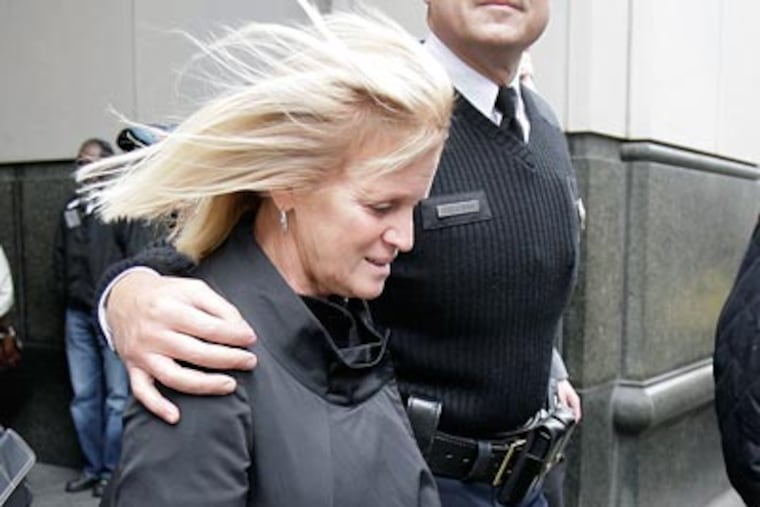Family talks of its life after Cassidy's death
On a mournful day of testimony that regularly brought men and women, jurors, veteran police officers, and prosecutors to tears, Officer Chuck Cassidy's widow told a Philadelphia jury yesterday about life after 10:30 a.m., Oct. 31, 2007.

On a mournful day of testimony that regularly brought men and women, jurors, veteran police officers, and prosecutors to tears, Officer Chuck Cassidy's widow told a Philadelphia jury yesterday about life after 10:30 a.m., Oct. 31, 2007.
"We left the hospital, and Chuck never came home. We never came home, either," said Judy Cassidy, his wife of 26 years and the mother of their three children.
Cassidy testified for about 20 minutes during the penalty phase of the trial to determine whether her husband's confessed killer, John "Jordan" Lewis, 23, should be put to death.
She read from a letter describing in melancholy detail a life decimated by her husband's death after he walked into a North Philadelphia doughnut shop as Lewis was robbing it.
Once a close-knit family that took pains to celebrate birthdays and holidays in high style, Cassidy said, "We don't celebrate holidays, there are no decorations, and I can't bring myself to buy birthday cards for the kids.
"All I do is cry alone at home," she added. "Life sucks."
By day's end, the late hour and the emotional testimony appeared to have taken their toll on the jury's four men and eight women, and they asked to return Monday to finish their task.
Common Pleas Court Judge Jeffrey P. Minehart said that when the penalty-phase hearing resumed, jurors would hear closing arguments from the defense and prosecution lawyers and then his legal instructions before they consider Lewis' fate.
If the jury decides not to impose the death penalty, Lewis will automatically get life in prison without the chance of parole.
Jurors also heard from the Cassidys' oldest child, Katie, who testified about her 21st birthday, which fell a few weeks after her father's death.
Looking at her father's work schedule after he died, she said that she saw he planned to take her birthday off.
Father and daughter had been looking to celebrate her 21st with a highball at midnight.
Instead, Katie Cassidy said, she drank that highball alone.
Officer Cassidy's brother-in-law Anthony Conti read a letter from Cassidy's daughter Colby.
The letter described a tight-knit family that had few luxuries but loved the simple pleasures of shared Sunday dinners and holidays.
"We were happy, we were perfect, we were everything we ever wanted," Colby Cassidy wrote.
The youngest Cassidy child, John, a high school senior, did not testify.
Cassidy's former partner, retired Officer Michael Mahalis, told the jury: "It is heartbreaking to see such good people deal with such a horrible and sudden loss."
Mahalis, who called Cassidy, 54, "my best friend," was choking back tears from the moment he took the stand. He eventually could not continue.
Assistant District Attorney Edward Cameron took over the reading, and he, too, was overwhelmed. Cameron's fellow prosecutor, Jennifer Selber, finished.
Lewis' family, pleading for his life, said they could not explain what led him to embark on a series of six armed robberies in fall 2007 that ended with Cassidy's murder.
"I'm truly sorry the Cassidy children and his wife have to go what they're going through and what we are all going through, I truly am," testified Lynn Dyches, Lewis' mother, a veteran of the Army National Guard and a Philadelphia prisons correctional officer who raised her son and two daughters alone.
Dyches, Lewis' grandmother, and his younger sister, Jasmine, all described Lewis as a child who was close to the family. All also testified that they thought Lewis missed the presence of a male role model in his life.
Lewis' father, John Sr., was shot in the head and killed when the boy was 5. According to court records, Lewis Sr. was a bystander caught in the armed robbery of a drug dealer in Hunting Park.
One person the jury did not hear from was Lewis himself, who told Minehart he did not want to testify in the penalty phase of his trial.
Lewis did not testify at his trial, either, and defense attorney Michael Coard called no defense witnesses.
On Thursday, the jury found Lewis guilty of first-degree murder - a malicious, purposeful premeditated killing - for shooting and killing the 25-year veteran officer as he walked in on Lewis' holdup at the Dunkin' Donuts shop at 6620 N. Broad St. in West Oak Lane.
Cassidy, shot once in the head, died the next day.
The first-degree murder verdict led to yesterday's hearing to determine whether Lewis should be executed by lethal injection or sentenced to life in prison.
In his opening statement, defense attorney Bernard L. Siegel asked jurors to remember they were sentencing a person about whom they knew little.
"There's nothing about first-degree murder that can make it more terrible or less terrible," Siegel said.
Siegel said he would argue that Lewis' actions should be mitigated by his age - he was 21 when he shot Cassidy - and the background from Lewis' mother and family.
He emphasized jurors' stark choice: Lewis will remain behind bars in a maximum-security prison until he dies or "until he comes out for execution."
Selber told the jury death was the only possible sentence based on the evidence.
He said that of the aggravating factors the jury must consider to impose the death penalty - it need only find one - three were inherent in the first-degree verdict: killing a police officer in the line of duty, killing while committing another crime, and a "significant history of felony convictions."
Lewis provided the last of those three when he pleaded guilty on the first day of trial to a general count of murder and six armed robberies, including the robbery in which Cassidy was killed.